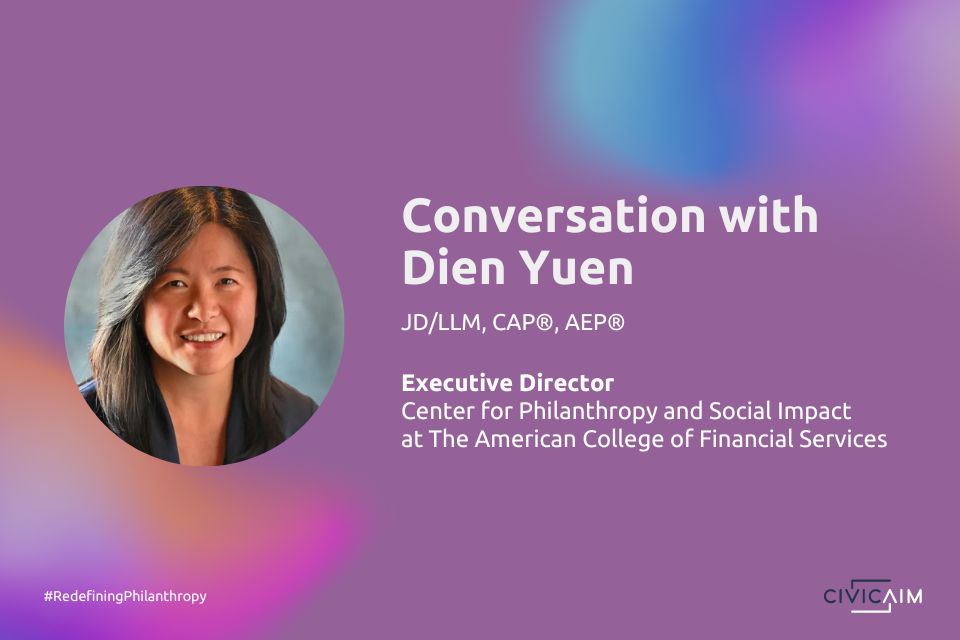
Redefining philanthropy: A Conversation with Dien Yuen
August 25, 2022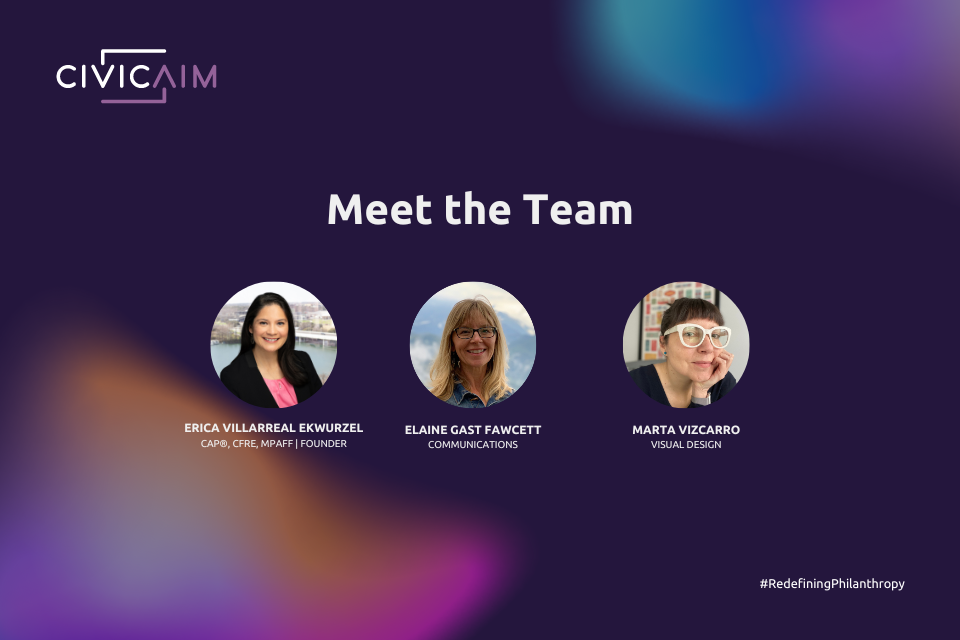
Redefining philanthropy: A Conversation with the Women Behind CivicAIM
March 10, 2023
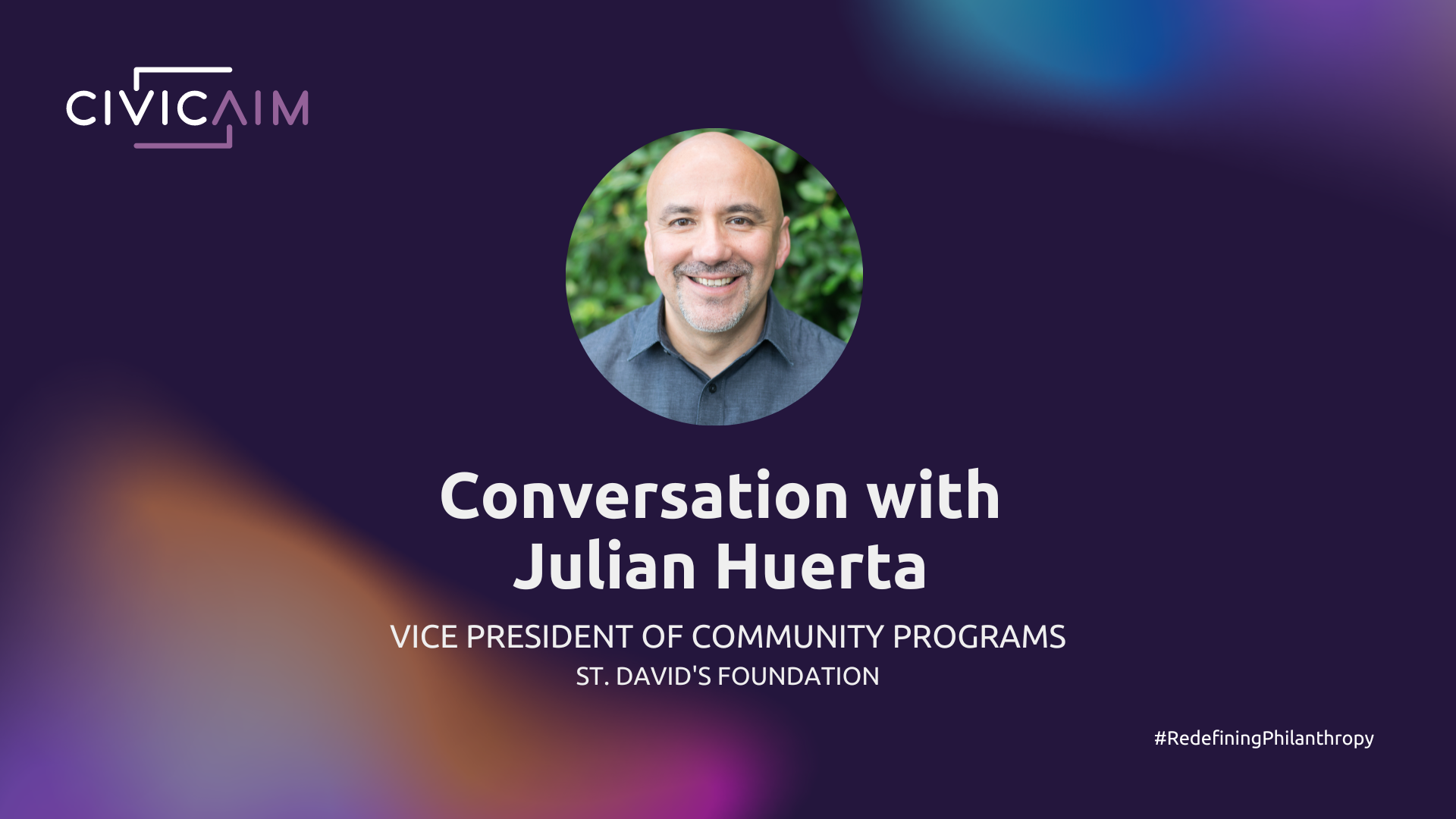
With so much going on in the world, in our neighborhoods, and our lives, I find it helps to pause every now again and take a breath—reflecting on the progress we’ve made, as a society and as philanthropy, toward equity and justice, and how very far we still have to go.
As a philanthropic professional of color, I see the critical need for more diverse and representative leaders—leaders who help shape solutions with and for their respective communities. People representing groups of color have valuable, real-world insights and contributions—and not including or recognizing those insights has, historically and in the present day, stifled philanthropy’s impact. It’s nearly 2023, and high time we change that trend.
I’m thrilled to share a recent conversation I had with my colleague and friend, Julian Huerta, where we discuss some of the challenges philanthropy and nonprofits face—and ways that philanthropic practitioners of color can bring their experience and perspective to make change. I met Julian more than 10 years ago when he was Deputy Executive Director of Foundation Communities—Central Texas’ largest nonprofit provider of affordable housing. Today, he is the
Vice President of Community Programs at St. David’s Foundation, one of the largest health foundations in the U.S., funding more than $80 million annually in a five-county area surrounding Austin. Julian is an incredible leader in community development who now brings that lens to his role in grantmaking and direct programming.
Here’s an excerpt of my conversation with Julian. You can watch the full video here.
Erica: How did you first get involved in community development and housing? What’s your why for dedicating so much of your career and life in service to this cause?
Julian: Growing up in San Antonio, I had a family who was involved in the community. I developed a sense of place and belonging in a community, in a neighborhood, and that has remained a big part of me. I also developed an awareness of the ways different things play out in communities that sometimes lift people up and sometimes hold people back. San Antonio has been a city for more than 300 years, and most of that time it’s been a Latino community. Yet only in my lifetime have Latinos gained any kind of political power in the city. Growing up, I got to watch that and learn from that—and it definitely influenced me.
Erica: After all those years in community development, you recently transitioned to a philanthropy role at St. David’s Foundation. Perhaps you can share more about the Foundation’s role as a grantmaker and service provider.
St. David’s, like so many other big foundations, has many levers to affect change and improve conditions for people. It goes beyond grantmaking, which is huge, to the ability to convene people and focus attention on challenges—those are great tools too.
St. David’s is a foundation but we have an active partnership with St. David’s Healthcare. We reinvest proceeds from hospital system back into the community and we have a focus on health equity. We try to address inequities in our system, with a goal that someone’s ethnic background or zip code shouldn’t be a predictor of their health outcomes. In addition to grantmaking, we run direct service programs—including a mobile dental program serving kids at Title 1 schools, and a scholarship program for high school seniors who want to pursue careers in healthcare.
Erica: How has switching from a community nonprofit to a philanthropic foundation changed the mindset you bring to your work?
Julian: In my prior organization, we were dependent on external funding. It was always a challenge to have enough resources to do good work, which created a scarcity mindset—that there is never enough. We always had to adjust our planning and expectations to these limited resources, which then limited our creativity and innovation.
In this role, I’ve been able to step out of that and think more strategically around the ways we can affect the best change and be most impactful. It’s a great luxury to be in that position, yet I continue to talk with my colleagues about the impact of the scarcity mindset and the toll it can take on our nonprofit partners. In philanthropy, we have an opportunity to change that. If we expect organizations to do good work, we have to support their sustainability and their staff.
Erica: Why is it critical that we reimagine philanthropy at this time? What is required of all of us as practitioners in the field?
It’s critical that we bring new voices and perspective into the conversation. And that we demonstrate trust in communities, in partners, in grantees. Trust is important in our society and in communities, and philanthropy has the real opportunity to build and demonstrate trust. You have to give trust to get trust and we have the opportunity to step up in this way.
I hope you enjoy the episode! My hope is that the Redefining Philanthropy series is a forum that sparks ideas and inspires action—moving us all closer to a philanthropy that is truly equitable, representative, and impactful. When all people’s voices are heard, everyone benefits.
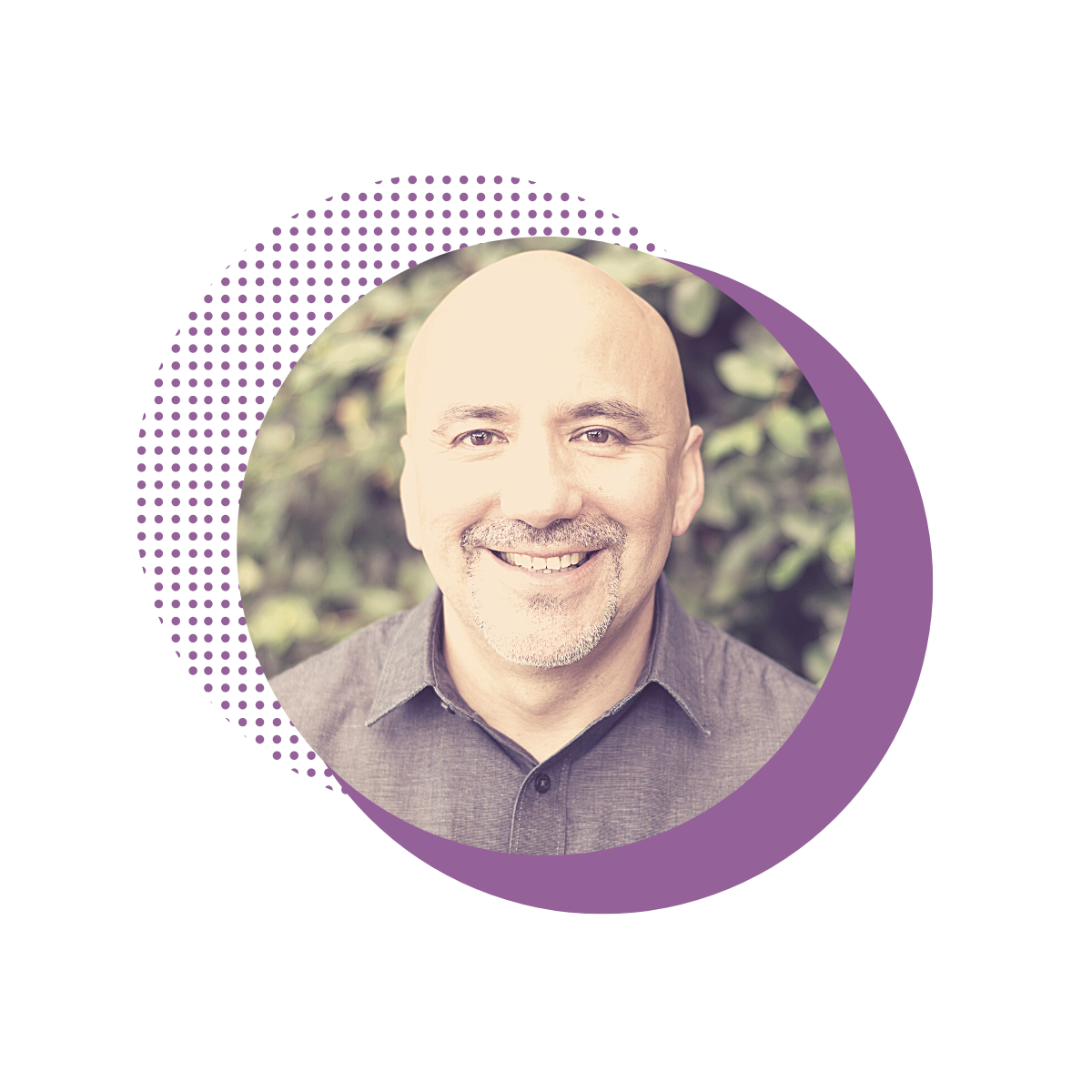
"Philanthropy has a responsibility to incorporate more voices, diversity of thought and diversity of experiences in building community solutions. I hope to bring this forward in my role."
CivicAIM– In the Field
It’s been a productive and meaningful fall and winter for CivicAIM. Here are a few of our recent convenings and leadership opportunities.
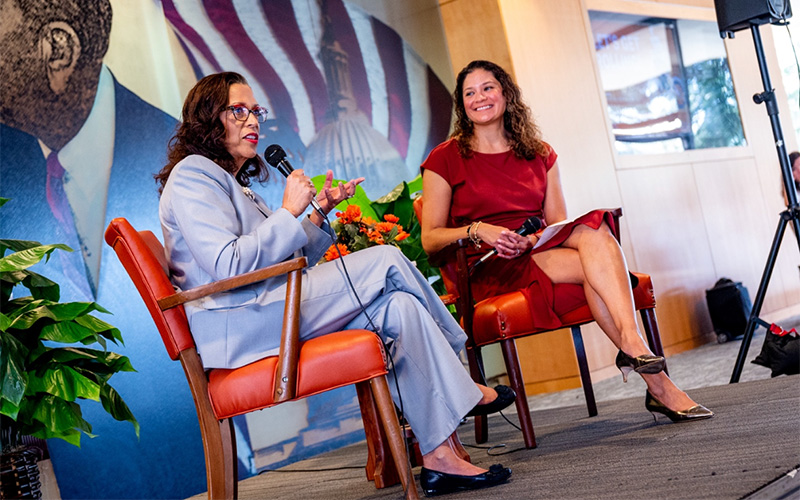
Photo Credit: LBJ School of Public Affairs
Diversity and Philanthropic Leadership: On October 5, 2022, Erica Villareal Ekwurzel led a discussion at the RGK Center for Philanthropy and Community Service, in honor of Hispanic Heritage Month. The event was well attended by the University of Texas at Austin’s faculty and staff, community supporters, and the Lyndon B. Johnson School of Public Affairs’ students and alumni. Erica facilitated a conversation with Jo Carcedo, Vice President for Grants at the Episcopal Health Foundation, about her experience in philanthropy as a Latina and how philanthropy can incorporate the communities they work with and within.
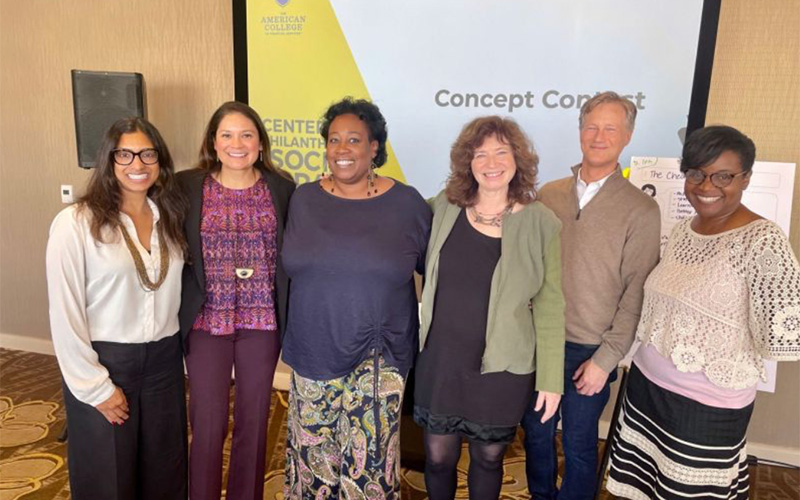
Photo Credit: The Center for Philanthropy and Social Impact at the American College of Financial Services (captured National Network of Consultants to Grantmakers in attendance)
Mapping the Future of Philanthropic Advising: The Center for Social Impact and Philanthropy at The American College of Financial Services brought a group of philanthropic advising practitioners from multiple sub-sectors to explore what is next for our burgeoning field. Together we examined how philanthropic practitioners can be better connected, the shared competencies we need next, how we will develop and retain a larger talent pool reflective of rising generations, and how we will respond to calls for accountability, transparency, and related regulatory changes.
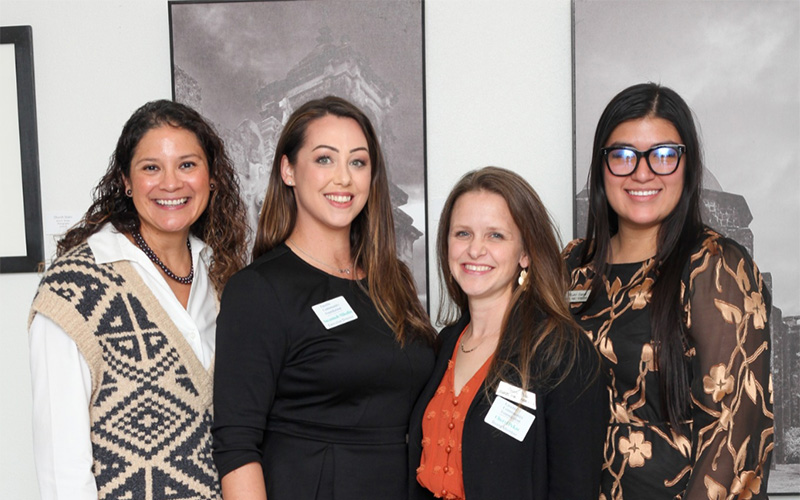
Photo Credit: Fayette Community Foundation
Rural Philanthropy Day: On November 4, 2022, The Fayette Community Foundation partnered with the Stanzel Family Foundation and others to educate local nonprofits and build their capacity and relationships with funders in rural areas. Erica moderated a funder’s panel during the luncheon that explored the variety of grantmaker models, ways to they engage with nonprofits and highlight best practices in cultivating effective partnerships.
What’s Your Philanthropic Aim?
CivicAIM is a philanthropy consulting firm focused on strengthening grantmaking, governance, and impact. CivicAIM supports mission-driven families, small-staffed foundations, funder collaboratives, and giving circles. Together with you, we develop and execute grant and evaluation strategies that lead you to impact, and we facilitate critical conversations and transitions that strengthen your board’s decision making.

